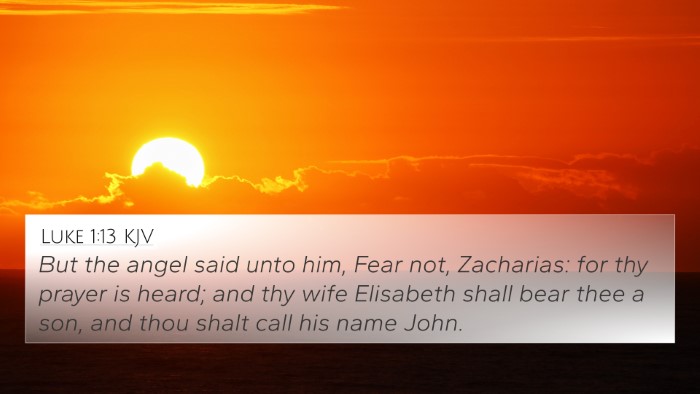Understanding Luke 1:63
Verse: Luke 1:63 states, "And he asked for a writing tablet, and wrote, saying, 'His name is John.' And they all marveled."
Summary of Insights
This verse highlights a significant moment in the narrative of the birth of John the Baptist. Zechariah, the father of John, demonstrates his obedience to the angel's proclamation regarding the name of his son. The act of writing on a tablet signifies his faith and the miraculous nature of John's birth. This response also serves as a testament to God's plan and the fulfillment of prophecy.
Commentary Insights
Matthew Henry: Henry emphasizes the importance of names in Scripture. The name "John" means "the Lord is gracious," reflecting God's mercy towards His people. Zechariah’s proclamation affirms divine instruction and showcases his restored ability to speak following a period of muteness due to his initial doubt.
Albert Barnes: Barnes notes the significance of the writing tablet as a means of communication during Zechariah’s silence. The act symbolizes clarity and the swift acknowledgment of God’s word. This moment connects to the broader theme of obedience throughout Scripture, as Zechariah aligns his heart with God's decree.
Adam Clarke: Clarke explains the cultural context, highlighting how naming a child often involves deep familial significance. The miraculous nature of John's conception leads to communal amazement, suggesting a movement of the Spirit among the people watching this event unfold.
Bible Verse Cross-References
- Luke 1:13: Discusses the angel's announcement to Zechariah about the birth of John.
- Luke 1:57-58: The birth of John and the joy it brought to Elizabeth and the community.
- Matthew 1:21: The announcement of Jesus’ name, illustrating the divine naming theme.
- Isaiah 40:3: Prophecy concerning John the Baptist as the forerunner of Christ.
- Malachi 4:5: A prophecy that speaks of sending Elijah, correlating to John's role.
- Luke 1:76: Zechariah’s prophecy about John's future role as the prophet of the Highest.
- Mark 1:4: Reference to John's ministry of baptism and repentance.
Thematic Connections
The theme of obedience and divine purpose is prevalent throughout the Bible. This verse connects to a greater theological narrative of God orchestrating events and speaking truths through His chosen instruments. The linking of biblical scriptures often highlights how specific events tie into God's overarching plan for redemption.
Comparative Bible Verse Analysis
When conducting a comparative study, it becomes evident that the narrative surrounding John's naming parallels several key biblical principles, including:
- Divine Favor: Similar to Samuel’s birth announcement (1 Samuel 1:20).
- Faith in God's Promise: Abraham and Sarah's response to God's promise of Isaac (Genesis 18:10).
Scriptural Cross-Referencing
Using tools for Bible cross-referencing, we can note that multiple verses collaborate to develop a fuller understanding of God's interaction with humanity, particularly concerning pivotal figures like John the Baptist. Identifying the connections between Old and New Testament references enhances our comprehension of God’s covenantal promises.
Concluding Thoughts
In conclusion, Luke 1:63 is a rich text that serves as a window into the unfolding plan of God through the figure of John the Baptist. By utilizing comprehensive biblical cross-reference resources, one can draw parallels and connections that deepen their understanding of Scripture.








